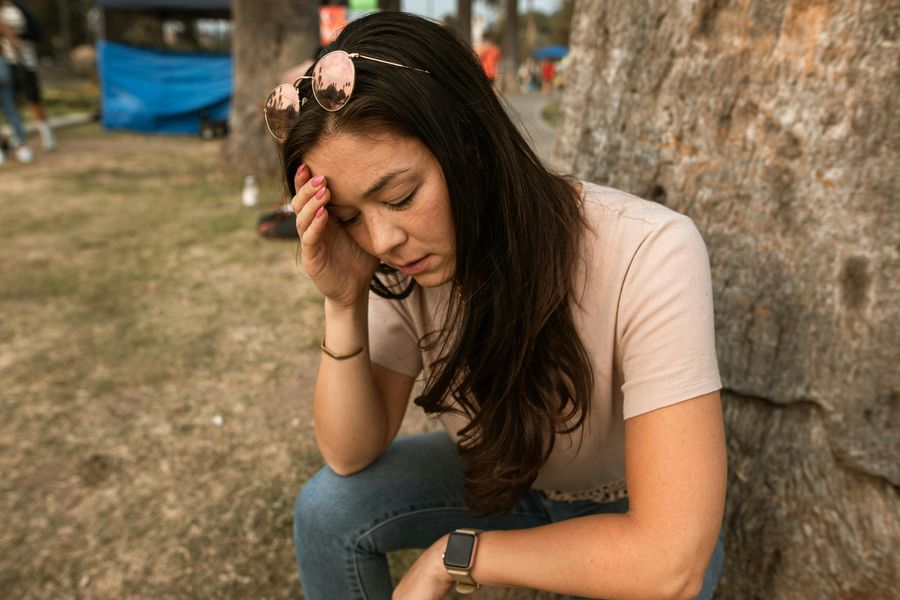Lovesickness: Understanding the Emotional Toll of Unrequited Love
Have you ever found yourself hopelessly in love, consumed by an overwhelming desire for someone who cannot or will not reciprocate your feelings? If so, you may have experienced lovesickness, a state of emotional distress that can have negative effects on both your mental and physical health.
What is Lovesickness?
At its core, lovesickness is an intense emotional state brought on by unrequited love or a perceived inability to connect romantically with a desired partner. It can be experienced by anyone, regardless of age, gender, or sexual orientation. In some cases, lovesickness can lead to feelings of hopelessness, helplessness, and even depression.
What Causes Lovesickness?
There are many factors that can contribute to lovesickness. One of the most common is emotional rejection, when someone you care deeply about does not feel the same way you do. This can be particularly difficult if you have invested a lot of time and energy into the relationship and feel like you are being dismissed or not valued.
Other factors that can lead to lovesickness include an inability to connect romantically with others, a desire for love that is not being met, or a lack of self-esteem and confidence.
The Negative Effects of Lovesickness
Lovesickness can have a significant impact on your mental and physical health. The emotional distress it causes can lead to feelings of anxiety, depression, and even suicidal thoughts.
It can also weaken your immune system, leaving you more susceptible to illness, and interfere with your ability to sleep and concentrate. In extreme cases, lovesickness can even lead to physical symptoms such as heart palpitations and nausea.
Finding Ways to Cope with Lovesickness
If you are experiencing lovesickness, there are steps you can take to help alleviate the emotional distress you are feeling. One of the most important is simply acknowledging the reality of the situation and allowing yourself to grieve the loss of the relationship or connection you desired.
It can also be helpful to talk to someone you trust, such as a friend or therapist, who can offer support and perspective. Engaging in self-care activities such as exercise, meditation, or creative pursuits can also be beneficial.
In some cases, seeking professional help may be necessary to address the psychological effects of lovesickness. A therapist or counselor can help you work through your feelings and develop coping mechanisms to manage the emotional distress you are experiencing.
Conclusion
Lovesickness can be a difficult and painful emotional state, but it is important to remember that you are not alone. Many people have experienced similar feelings of unrequited love and have found ways to cope and move forward.
By acknowledging your emotions, seeking support from loved ones, and taking care of yourself, you can begin to heal and find happiness in other areas of your life. Remember, your worth is not defined by another person’s affections, and there is love and happiness to be found in many different forms and relationships.
Signs of Lovesickness: How to Recognize and Address Emotional Distress
Have you ever found yourself feeling overwhelmed and consumed by the emotions of love? If your feelings are not reciprocated, it can be difficult to cope with the emotional toll of unrequited love.
Lovesickness is a state of emotional distress that can manifest in many ways. Below are some common signs of lovesickness that you may be experiencing:
- Mood Swings – Lovesickness can cause emotional instability, leading to mood swings and changes in personality.
- You may feel irritable, anxious, and easily frustrated.
- Isolation – You may feel the need to isolate yourself from others, withdrawing from social events and activities that you once enjoyed.
- Constant Tiredness – Lovesickness can be exhausting, leaving you feeling fatigued even after a good night’s sleep.
- Loss of Appetite or Overeating – Lovesickness can cause a change in appetite, leading to either a loss of appetite or overeating.
- Distraction – Lovesickness can cause a mental distraction, making it difficult to concentrate on everyday tasks or responsibilities.
- Stalking – You may find yourself constantly checking their social media accounts, monitoring their movements, or even stalking them in person.
- Treasuring Belongings – Lovesickness can lead to a sentimental attachment to belongings that remind you of the person, such as a gift, love letter or piece of clothing they left behind.
- Overanalyzing – You may find yourself repeatedly replaying past conversations or interactions with the person, analyzing everything they said or did in an attempt to uncover hidden meaning.
- Insomnia – Lovesickness can cause difficulties with sleep, leading to insomnia or nightmares.
- Confusion – You may feel confused and indecisive, unsure of what to do or how to move forward.
- Dizziness and Nausea – Lovesickness can have physical symptoms, including dizziness and nausea.
- Restlessness – Lovesickness can cause agitation, leading to fidgeting, pacing or other restless behaviors.
- Insecurity – Lovesickness can cause pervasive feelings of inadequacy, making you feel insecure about your worth or attractiveness.
Now that we’ve explored the signs of lovesickness, what can you do to cope with emotional distress and start healing?
Below are some suggestions on how to deal with lovesickness.
Focus on Their Shortcomings
When experiencing lovesickness, it can be helpful to focus on the shortcomings or flaws of the person who is causing you distress. Instead of romanticizing their qualities, try to see them in a more objective light.
This can help you to let go of idealized versions of them in your head, turning them into real people with their own set of flaws and weaknesses.
Try to Be Sociable
Socializing with others is a good way to get your mind off the person causing you distress. It is important to remember that there are many people out there who value and care for you.
Spend time with friends and family, join a club or group, volunteer, or engage in new hobbies or activities. This can help you to rediscover your social skills and build new connections.
Talk to Them
Communication is key to any successful relationship, and this is not an exception even when dealing with a case of unrequited love. Sometimes, speaking your feelings out in the open with the person who is causing you distress can help.
It can facilitate healthy conversations and promote emotional catharsis. Remember, however, that expressing your feelings could lead to an unwelcome response that could worsen the way you feel.
Weigh your options carefully before deciding to pursue this route.
Keep Yourself Occupied
Distraction helps you get over the pain you are feeling, and keeping yourself occupied is the best way to curb your thoughts. Devote time and energy to your hobbies and work, read a book or listen to music, and immerse yourself in activities that do not remind you of the person.
Delete all Memories
It may be painful to let go of things that remind you of the person, but it is often necessary to move on. Remove pictures, gifts, messages, or any other reminders of them from your surroundings.
Erase any media files containing their images or throw away any personal effects. This action will help you break any emotional ties still binding you to them.
Think About Them, Don’t Obsess
It is normal to think about someone you once cared for, but it is essential not to obsess over them. Control your thoughts by setting boundaries and disciplining your mind.
Resist the temptation to idealize them in your head or fantasize about them. Focus on the reality of the situation, and accept that your feelings may never be reciprocated.
It is the first step to setting yourself free.
Give Yourself Time
Healing takes time, and accepting your feelings may take longer than initially anticipated. Do not rush the process, and do not pressure yourself to get over somebody quickly.
Allow yourself time to grieve and gradually acknowledge your feelings. In time, the painful emotions will subside, and you will be able to move forward.
Seek Help From a Therapist
It is not uncommon to feel overwhelmed when dealing with lovesickness. If you are struggling to move on, and it begins to affect your day-to-day life, it may be useful to seek help from a therapist.
A professional may be able to help you work through your feelings and understand the root causes of your emotional distress.
Conclusion
Lovesickness can be a difficult and challenging emotional state, but it is possible to move forward and find happiness again. By recognizing the signs of lovesickness, and implementing coping mechanisms, you can start to heal and open yourself up to new experiences and relationships.
Remember, the pain you are feeling now is only temporary, and with time and patience, you can regain control of your emotions and start living a fulfilling life again.
Understanding Lovesickness: The Role of Hormones and the Importance of a Support System
Lovesickness is a common emotional state experienced by many people.
It can be a result of unrequited love or a perceived inability to connect romantically with a desired partner. Whatever the cause, it is clear that lovesickness can have a significant impact on both our mental and physical health.
In this article, we will explore the role of hormones in lovesickness and the importance of having a support system to help manage the emotional distress of it.
The Role of Hormones in Lovesickness
Lovesickness can have a profound effect on our hormonal balance, particularly on the hormone cortisol. Cortisol is known as the “stress hormone” because it is often released in response to stress and emotional distress.
Research has shown that people who are lovesick have higher cortisol levels than those in happy marriages or relationships. This increased cortisol level may also lead to physiological symptoms, such as a weakened immune system, weight fluctuations, and digestive issues.
In addition to cortisol, lovesickness can also affect other hormones like dopamine and oxytocin. Dopamine is involved in feelings of reward and pleasure, and it is released when we experience something positive or enjoyable.
Oxytocin, commonly referred to as the “love hormone,” is associated with feelings of attachment and trust between two individuals. In the context of lovesickness, dopamine and oxytocin levels may fluctuate dramatically, leading to emotional highs and lows.
It’s essential to understand the role hormones play in lovesickness so that we can better manage our emotional distress and physical symptoms. Exercise, meditation, and engaging in healthy activities can help to regulate cortisol levels and promote a sense of calm and balance.
The Importance of a Support System
When experiencing lovesickness, having a support system can make a significant difference in how you cope with emotions. A support system can include family, friends, or even a therapist.
Having someone to talk to and confide in about your feelings can help to relieve stress and emotional distress. Additionally, leaning on loved ones can help to improve our sense of self-worth, provide reassurance, and help us to maintain perspective on the situation.
They might also suggest ideas on how to cope with the pain, which could come in handy in coming to terms with the situation. Finding a support system can be challenging, especially if you don’t feel like anyone around you understands how you feel.
In these cases, seeking professional help can be beneficial. A therapist can help you work through your feelings and provide a supportive and objective perspective.
Conclusion
Lovesickness is a complicated emotional state that can impact all aspects of our lives. It is essential to understand the role of hormones in lovesickness and the importance of having a support system to manage emotional distress.
By maintaining a healthy lifestyle, relying on loved ones, and seeking professional help, we can better cope with the challenges of lovesickness and move forward towards healing. Remember, the pain you are experiencing is not permanent, and with time, patience, and emotional support, you will overcome it.
In conclusion, lovesickness is a natural emotional state that can result from unrequited love or a perceived inability to connect romantically with a desired partner. It can have a significant impact on both our mental and physical health, including hormonal imbalances that heighten feelings of stress and emotional distress.
Understanding the role of hormones in lovesickness and having a reliable support system can help us to manage the pain and move forward towards healing. Remember that while lovesickness is challenging, it is manageable, and with the right tools and approach, you can create a path towards emotional wellbeing and find love again.



